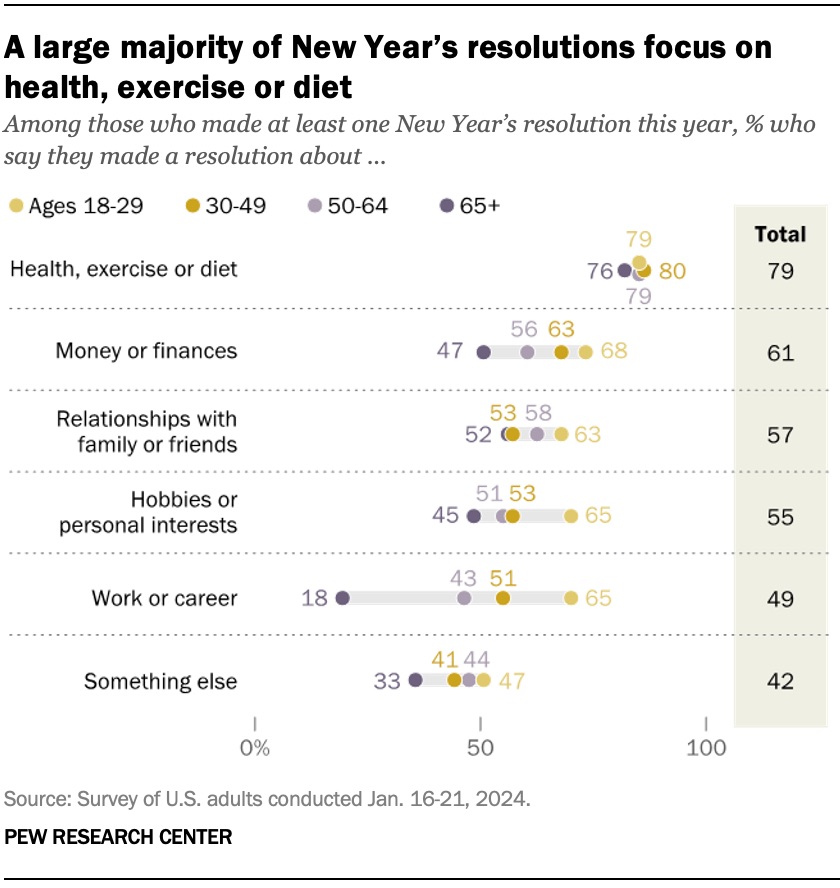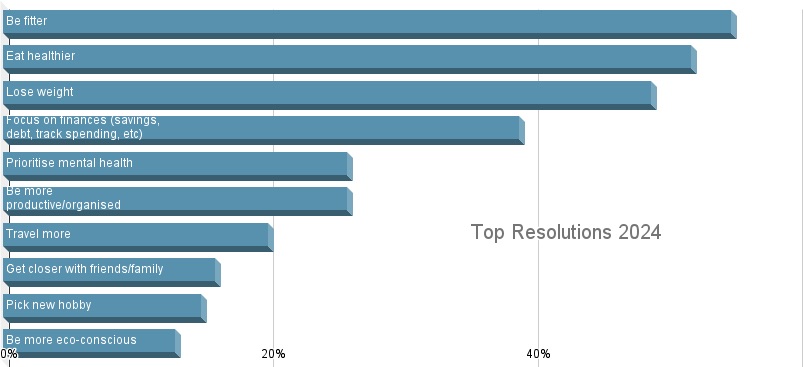As the new year approaches, many of us are already coming up with 2025 resolutions. However, statistically, more than 90% will fail to fulfil them either entirely or partially. Almost half have already quit by the end of January. Lack of motivation and challenges faced on the way to one’s dreams are often insurmountable obstacles. Perhaps there’s an avenue for innovative technologies like AI to help those struggling to improve their lifestyles.

Better paid jobs, healthier lifestyles, taking up some sports, improved relationships, exciting experiences, and changes in looks – all these points get to people’s resolution lists each year. However, many or even most of them end up exactly where they started: on paper or within the digital notes. The struggle is real. Getting an idea or an image of a ‘new you’ from imagination to reality may be challenging. Some people turn to motivation books, coaches, or other types of people and content that can boost their motivation to proceed with set goals. Others just quit, seeing no way to make their desires real.
What if the answer to your problems is already in your pocket or device? If the familiar methods don’t work, why not turn to novel technologies? There’s a lot being said about the utility of artificial intelligence (AI) for businesses. Not only tech players who develop AI tools but also companies in various industries note the improvements brought by AI use. It seems AI can make everything faster, simpler, and more efficient, releasing a lot of growth and profit opportunities. Why not apply this potential to your personal goals as well?
Let’s see how it’s possible.
What Do People Want to Change in Their Lives?
The early 2024 Pew Research Center survey found that nearly half (49%) of young adults in the U.S. aged between 18 and 29 make at least one resolution on New Year’s Eve. Across all age cohorts, the tradition of making promises to change one’s life next year is popular among about one-third of the population.
About 79% of people make resolutions about health in different forms. The resolution can be a gym commitment or a promise to quit smoking. Not less significant are resolutions about money or finances (61%), personal relationships (57%), hobbies or personal interests (55%), or work and career (49%).

An identical survey conducted in the UK by YouGov last holiday season displayed similar results, explaining in detail what exactly people want to change about their health, finances, or personal affairs.

How Can AI Tools Help to Achieve Those Goals?
The most common AI tools available to an average person with a smartphone or laptop are generative AI assistants that answer user questions and perform other requests. We will test if AI chatbots can serve as Santa’s little helpers for grown-ups and deliver handy tips and assistance to help us make it through New Year’s resolutions with flying colours. (Spoiler alert: They can, and not only in the holiday season but also throughout the year as your goals change.) Besides, we’ll discover a few AI-powered apps that can boost your efforts to change whatever you want in life.
AI and Health
To begin with, if you ask an AI assistant how you can get fitter, it will give you great advice on correct goal setting, developing a balanced fitness routine, step-by-step progress, mindful nutrition, and even ways to keep engaged beyond the first spark of enthusiasm.
Besides the general information you might already know, AI helpers can draft a personalised fitness plan based on your goals, health state, and personal circumstances. For example, when I provided my preferences and related details to ChatGPT, I got a pretty nice and straightforward low-impact training plan for the chosen number of days and duration. The assistant also explained in detail how to do an unfamiliar exercise and even provided helpful video demonstrations with links upon my request. Additionally, I asked for a nutrition plan to fit my fitness goals. I got both general recommendations and an example of a daily menu with estimated portion sizes and variations of snacks. AI tools can also draft you a balanced and varied diet plan for the whole week or month if you wish.
Along with the help of an AI assistant, there are several AI-powered fitness apps (e.g., Fitness AI, Fitbod, Freeletics, Aaptiv, MyFitnessPal, etc). They create AI-powered personalised workouts based on relevant data, such as your height, weight, gender, body type, health issues, fitness goals, and available home or gym equipment. AI-powered workout apps adapt to users by analysing exercise frequency, timing, and patterns to enhance recommendations. When paired with fitness wearables tracking metrics like heart rate, sleep, and steps, these apps offer hyper-personalised workout plans tailored to lifestyle impact. Additionally, many apps use gamification and social features like leaderboards, challenges, and virtual rewards to boost engagement and make fitness enjoyable.
The last part of the commitment to health goals is motivation. To achieve that, you can also use an AI-powered assistant available on your smartphone, like Alexa or Gemini, for example. They can send you fitness or nutrition alerts with not just a beep but also motivational and encouraging messages like “You’re stronger than you think! Every workout brings you one step closer to your goal. Let’s move together!” at any time and frequency you find suitable. The only thing you have to do is assign them to that task and follow the notifications schedule.

AI Helps With Work and Finances
AI assistants can help you focus on your finances by providing guidance, tools, and strategies to improve financial awareness, manage your budget, set financial goals, and break these goals into actionable steps. The chatbots available on the market today can also provide strategies to pay off debts effectively and offer information about beginner-friendly investment options.
Let’s take a look at AI capabilities in the realm of financial education. AI assistants may suggest relevant and professional books, podcasts, or articles to improve your financial literacy. They also give general tips on improving credit scores, understanding loans, or managing taxes.
As for more personalised services, modern AI chatbots can draft a weekly or monthly budget for an individual or household based on your income, fixed and discretionary expenses, saving goals, and other financial details. If you provide your basic financial data, smart assistants can help you develop a strategy for debt recovery with a detailed repayment schedule and possible alternative plans. For those not dealing with debt, AI tools help calculate optimal savings amounts, to provide for retirement, vacation, emergency fund, and any other short- or long-term financial goals you have.
Here are some AI-powered budgeting and savings apps that can help you manage your finances efficiently:
- Credit Karma uses AI and machine learning to offer personalised financial recommendations, credit score monitoring, and spending insights, helping users manage their finances and improve credit health.
- YNAB (You Need A Budget): focuses on proactive budgeting with a zero-based approach. It helps you plan for every dollar and provides insights into spending patterns.
- Cleo: helps with budgeting, provides financial tips, spending breakdowns, and has some gamified elements to make managing money engaging.
- Rocket Money: (ex-Truebill), uses AI to analyse subscriptions, suggest cost-cutting measures, and predict spending habits.
- Goodbudget: employs the envelope budgeting system digitally, making it simple to allocate funds for specific purposes and shared budgeting.
- EveryDollar: focused on zero-based budgeting, it allows users to allocate their income into detailed categories, ensuring no dollar goes unaccounted for.
If you need more than budgeting and saving tips, and aim higher with better job aspirations, AI assistants can sort out millions of job offers, suggesting the most suitable for you, help you draft a CV and even prepare for the job interview.
For those, intent to keep their jobs but increase their own productivity to make more money, there are also personalised plans as well as helpful tips prepared by AI. Besides, most creative and non-creative professionals can actually use AI tools to simplify their daily tasks, or find inspiration.

AI is a Good Personal Advisor
Finally, those people who care to enhance their personal relationships, add motivation, versatility and joy to their lives can also leverage AI tools to discover psychological tips and tricks, educate themselves on the relevant topics, and even get a virtual personal companion and advisor.
If travel and experiences are what you lack in life, AI apps and assistants can help you find the most affordable deals and promotions, suggest hobbies, activities and events that you might explore, book your tickets and hotel reservations, and more. AI redefines travel experience by smart itinerary planning with updates based on real-time data such as weather, crowd density, traffic jams, flight cancellations, and user preferences. Besides, AI-driven navigation apps help tourists build the quickest, most sustainable or most picturesque routes across new cities, and alert them about changing traffic and weather conditions.
For those wishing to improve their environmental impact and become more eco-aware, AI can facilitate sustainable investing, help track their carbon emissions, find more sustainable purchases, and educate them on ways to reduce their carbon footprint or energy usage. After all, most smart home and smart city technologies employ some kind of AI to optimise appliances use, minimise carbon emissions, and improve efficiency of daily routines.
Summary
AI can help individuals achieve their lifestyle goals by providing personalised support for health, work, finances, and personal development. For health, AI tools offer tailored fitness and nutrition plans, while also keeping users motivated with alerts and progress tracking. In terms of finances, AI assistants can guide budgeting, debt repayment, and savings strategies, while offering personalised advice for improving credit scores or investments. AI-powered apps like Credit Karma, YNAB, and Cleo simplify financial management. Additionally, AI tools can assist in career planning, productivity, relationship building, and even travel planning, enhancing both personal growth and sustainable living.









